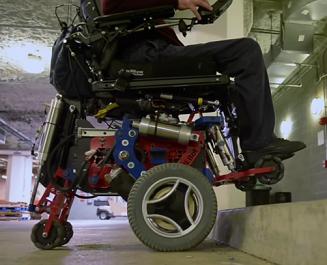
University of Pittsburgh’s Human Engineering Research Laboratory’s (HERL’s) Mobility Enhancement Robotic Wheelchair (MEBot) won the prestigious 2016 Blackwood Design Award for Best New Concept. The award judging panel was very impressed not only with the functionality of the design but the level of research involved as well as the fact that this was not looking for a problem to solve. It is intended for real life situations and comes from the experiences of the designers and engineers, several of whom use powerchairs.
McGowan Institute for Regenerative Medicine affiliated faculty member and principal investigator on the project Rory Cooper, PhD, FISA & Paralyzed Veterans of America (PVA) Chair and Distinguished Professor of the Department of Rehabilitation Science & Technology, Professor of Bioengineering, Physical Medicine and Rehabilitation, and Orthopedic Surgery at the University of Pittsburgh, and the Founding Director and VA Senior Research Career Scientist of HERL, says winning this recognition “is pretty exciting. It was a nice validation of our work and our design. Everybody is very happy.”
The Mobility Enhancement Robotic Wheelchair (MEBot) will tackle both curbs and challenging terrains. The large center driving wheels can reposition themselves to simulate front-, mid-, or rear-wheel driving. The four smaller caster wheels are controlled with compressed air and move up and down freely and independently. For climbing curbs, the front caster wheels lift up onto the curb, and then the driving wheels lift themselves up and forward onto the curb which lifts the chair onto the curb. This is done automatically, whenever MEBot senses a curb or step. The ultimate goal is for MEBot to climb a set of stairs.
The same general function is used to operate on icy or slippery surfaces. A traditional power wheelchair can get stuck on this kind of terrain. MEBot, however, uses its front and rear caster wheels to inch forward on the slick surface by extending its front casters, moving the seat forward, bringing the rear casters forward, and then repeating the process. Meanwhile, the seat stabilization system keeps the driver safely upright.
Watch the MEBot video here.
Blackwood is a pioneer in accessible housing, having built its first house in Dundee, Scotland, in 1972. Its founder, Dr. Margaret Blackwood, was the leading voice in Scotland in the ongoing campaign to improve the lives of people with disabilities in terms of housing, accessibility, and benefits, to name just a few. Today, the Blackwood vision is to be able to offer people beautiful, accessible, and affordable homes.
Congratulations, all!
Illustration: HERL.
Read more…
